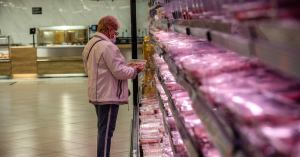The menu at Wendy’s is getting a little smaller amid the coronavirus pandemic, leaving some customers to ask “where’s the beef?” Known for its fresh, never frozen beef, in recent days, some Wendy’s locations across the country have removed burgers from their menus as meat shortages begin to affect the supply chain.
According to Bloomberg, the issue is currently impacting locations in California, where a quick look on the Wendy’s app showed that only chicken items were available for takeout or delivery orders from at least some of its stores in the state. Similar shortages are appearing in Kentucky, where local station WYMT reported shortages this past weekend, with a location in Hazard, Kentucky, stating that some items were unavailable. Meanwhile, lucky customers in Chicago can still easily get their hands on the Baconator bacon cheeseburger.
Videos by PopCulture.com
@Wendys is this the part where I say…”Where’s the beef?”#toosoon pic.twitter.com/cQwUz7uPTR
— Amber Olivas (@amberlyno) May 4, 2020
“As you’ve likely heard, beef suppliers across North America are currently facing production challenges. Because of this, some of our menu items may be in short supply from time to time at some restaurants in this current environment,” Wendy’s said in a statement to WYMT. “We expect this to be temporary, and we’re working diligently to minimize the impact to our customers and restaurants.”
Wendy’s, however, is not the only fast food chain to be impacted by the food shortages. Just last week, McDonald’s Canada announced that it would be removing Angus burgers from its menus and importing beef due to beef shortages. In a memo, the chain wrote that, “due to unprecedented COVID-19 impacts on the Canadian beef supply chain, we are temporarily adjusting our supply to incorporate beef from outside Canada – from pre-approved McDonald’s suppliers and facilities globally – in order to meet the current demand, effective immediately.”
The shortages come in response to the closure of a number of meat processing plants. As the coronavirus pandemic continues, some of these facilities have become breeding grounds for the virus and have seen some of the worse clusters. A Sioux Falls, South Dakota, Smithfield Food plant saw more than 700 of its 3,700 employees contract the virus, and as it shuttered its doors, Tyson Foods warned that “the food supply chain is breaking.”
Last week, President Donald Trump signed an executive order to keep meat plants open, citing the Defense Production Act. The move, however, has sparked some controversy from unions and activists who said the order will put workers’ lives in danger.





